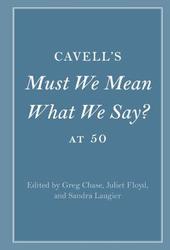
|
Cavell's Must We Mean What We Say? at 50
Hardback
Main Details
Description
In 1969 Stanley Cavell's Must We Mean What We Say? revolutionized philosophy of ordinary language, aesthetics, ethics, tragedy, literature, music, art criticism, and modernism. This volume of new essays offers a multi-faceted exploration of Cavell's first and most important book, fifty years after its publication. The key subjects which animate Cavell's book are explored in detail: ordinary language, aesthetics, modernism, skepticism, forms of life, philosophy and literature, tragedy and the self, the questions of voice and audience, jazz and sound, Wittgenstein, Austin, Beckett, Kierkegaard, Shakespeare. The essays make Cavell's complex style and sometimes difficult thought accessible to a new generation of students and scholars. They offer a way into Cavell's unique philosophical voice, conveying its seminal importance as an intellectual intervention in American thought and culture, and showing how its philosophical radicality remains of lasting significance for contemporary philosophy, American philosophy, literary studies, and cultural studies.
Author Biography
Greg Chase is a Visiting Assistant Professor of English at the College of the Holy Cross. He is the author of Wittgenstein and Modernist Fiction: The Language of Acknowledgment (2022), and has published articles in Modernism/modernity, African American Review and other journals. Juliet Floyd is Professor of Philosophy at Boston University. She is the author of Wittgenstein's Philosophy of Mathematics (2021) and co-editor of Philosophical Explorations of the Legacy of Alan Turing (with A. Bokulich, 2017) and Philosophy of Emerging Media (with J. Katz, 2016). Sandra Laugier is Professor of Philosophy at the University of Paris 1 Pantheon-Sorbonne. The translator of Cavell's work into French, she is also the author of Why We Need Ordinary Language Philosophy (2013) and co-editor of Cavell's posthumous volume Here and There (2022).
|